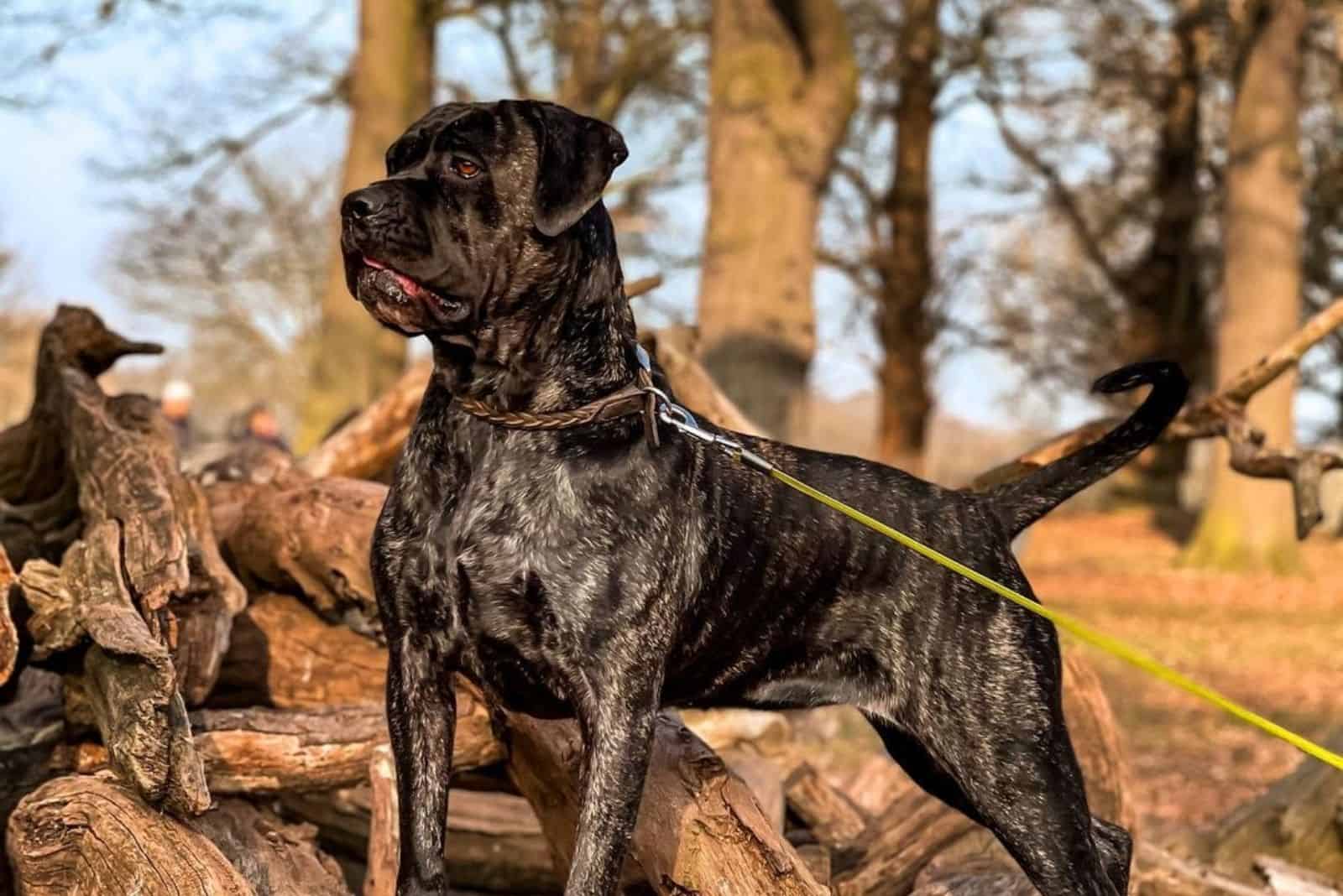With the current trend for micro-dogs sweeping the world, you might be forgiven for thinking that large dogs are out of favor. Celebrities appear in photo ops with French Bulldogs, Pugs, Chihuahuas, mini Poodles, or some combination of these in their arms. Very rarely do we see them with anything bigger than a small Spaniel.
So, are big dogs a thing of the past? Will we soon only see teacup, toy, and miniature breeds around?
It would be sad to think so as adorable as these tiny dogs are. The fact is, medium to large dogs are as popular as ever!
Many dog owners are indeed put off the idea of owning anything much bigger than a Labrador or a German Shepherd, and that’s understandable. Sharing your home with a massive dog, such as a Great Dane or a Bernese Mountain Dog carries its own set of challenges, and not everyone can cope with this.
Another sign that people are still in love with giant dogs is that they are experimenting with new breeds, such as the Cane Corso Bullmastiff mix.
You can also find Cane Corso dogs mixed with Rottweilers, Doberman Pinschers, and Dogue de Bordeaux, and Bullmastiffs crossed with the South African Boerboel, and the Pitbull mixed with either of them!
It takes a special kind of person (and a lot of room!) to look after a Cane Corso Bullmastiff mix. You might be one of these people, which is why you’re checking out this article all about a mixed breed of two very big dogs.
We’re here to help you learn more about this hybrid as well as find out more about the parent breeds. By the end of this article, you’ll have a better idea as to whether this is the dog for you!
What’s The Difference Between A Bullmastiff And A Cane Corso?
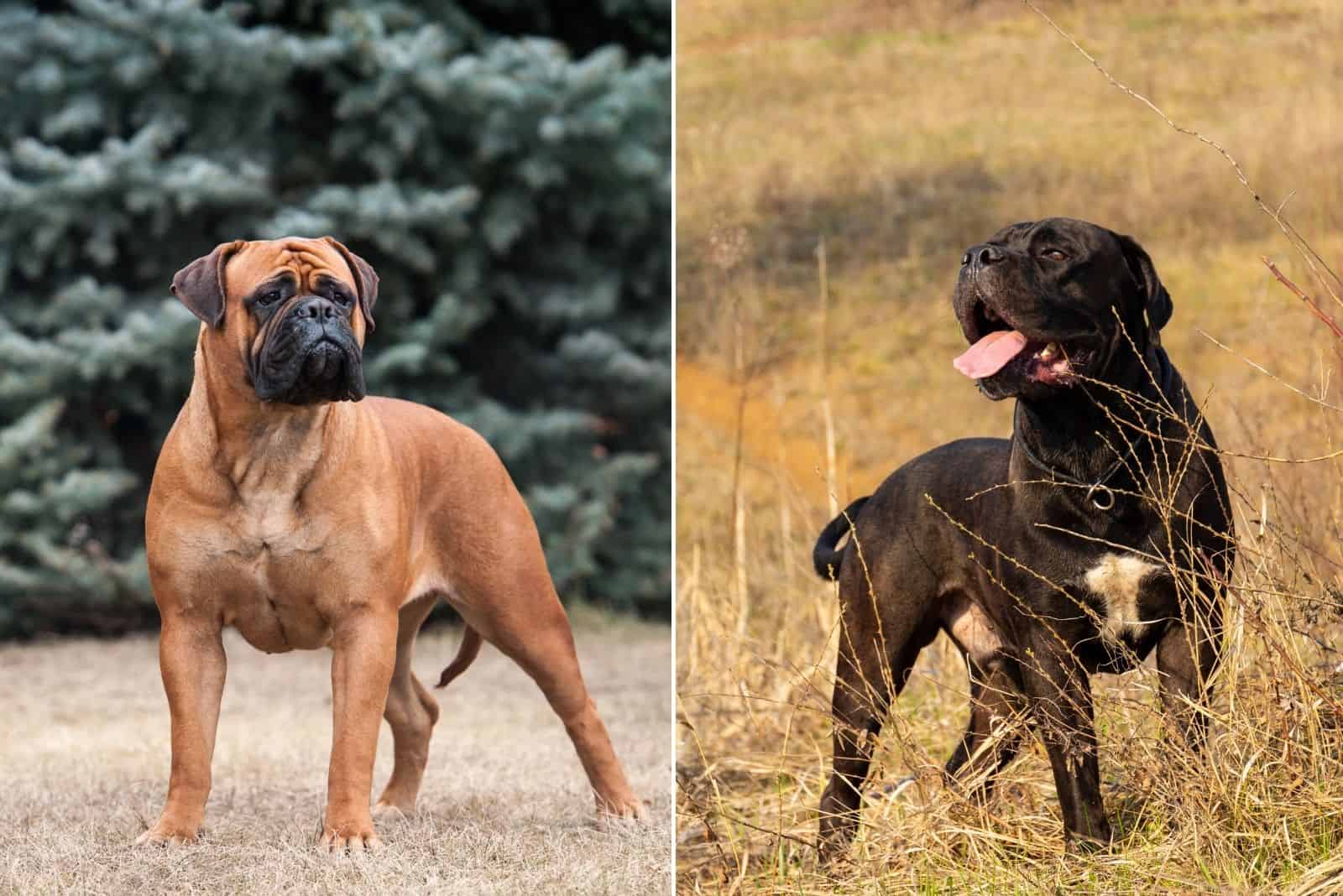
Let’s begin by exploring the differences between the two dogs involved. Neither of these breeds is especially well known, particularly the Cane Corso. Some of you might not even be sure how to pronounce the name. To save your blushes, the first word sounds like CAH-nee, and the second word is pronounced just as you would expect.
The Bullmastiff is itself a cross between the Bulldog and the English Mastiff! These dogs were first bred in the late 1800s in England to guard the country estates belonging to the English aristocracy.
Poaching was rife, despite the harsh penalties (including hanging!) and the culprits had nothing to lose. When cornered by a gamekeeper, they would fight to the death if necessary to make their escape.
Bullmastiffs were bred to be large, intimidating, fearless, intelligent, and alert. They were agile enough to chase down intruders and powerful enough to hold them until the gamekeeper could catch up. Their size alone was usually enough to deter would-be poachers from entering the grounds.
As the country estates declined (most were decimated by World War I) and poaching became a thing of the past, Bullmastiffs were kept mostly as pets or entered into dog shows.
Cane Corsi (the plural of Cane Corso) have a very different history. Although they’re classed as one of the mastiff breeds, they are part of the sub-category called Molosser. These were big, heavy-boned dog breeds that were developed by ancient Greeks and taken back home by invading Roman troops.
The original Corsi had a tragic and brutal purpose. History records that these dogs were sent into battle with barrels of burning oil strapped to them. This was designed to cause panic and confusion among the enemy, and you can be pretty sure that this is exactly what happened!
As times changed, they became a familiar sight across Italy where they were used for hunting, droving, and guard dogs. This last role is where they take their name as Cane Corso literally means guardian dog.
Both of these breeds are kept as pets and as guard dogs today not because they are particularly aggressive, but because of their intimidating size and strength. They are protective and fiercely loyal to their owners. Don’t expect them to back down if they detect a threat!
Now, let’s compare their sizes:
[table id=160 /]
[table id=161 /]
As for their coats, the Cane Corso can be red, black, fawn, gray, gray brindle, black brindle, and chestnut brindle.
The Bullmastiff’s coat is red, red brindle, red fawn, fawn brindle, or plain old fawn.
It’s a safe bet that a litter of Cane Corso Bullmastiff mix puppies will have a mix of any of these colors.
In other areas, they are very similar, such as in their temperament and energy levels.
Everything is large with Cane Corso Bullmastiff mix. A large, bed, a large collar, a large, harness… But the quality of these products is… skyrocketing!
[table id=209 /]
Are Italian Mastiffs And Cane Corso The Same?
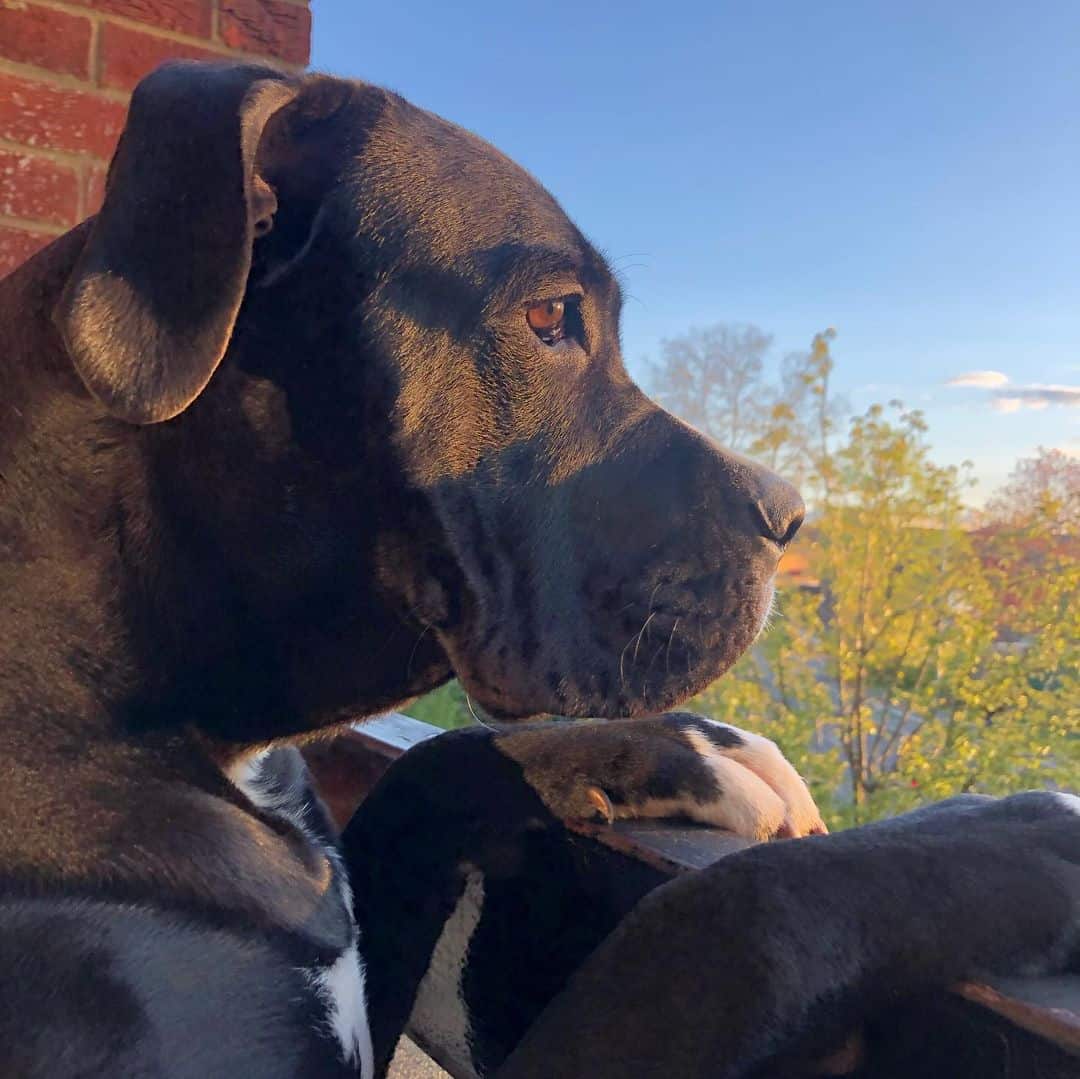
Photo from: @nalasworld._
In a way, they are the same, and sometimes the names are used interchangeably.
However, they are just one of two Italian Mastiff breeds. The other one is the Neapolitan Mastiff, their slightly larger cousin.
It’s easy to tell the two apart as they don’t look alike in any way except for their enormous size. The Neapolitan Mastiff has great folds of skin, and is a bigger drooler than its cousin!
The Cane Corso is well toned and muscular, the athlete of the Mastiff breeds.
Cane Corso Bullmastiff Mix Puppies
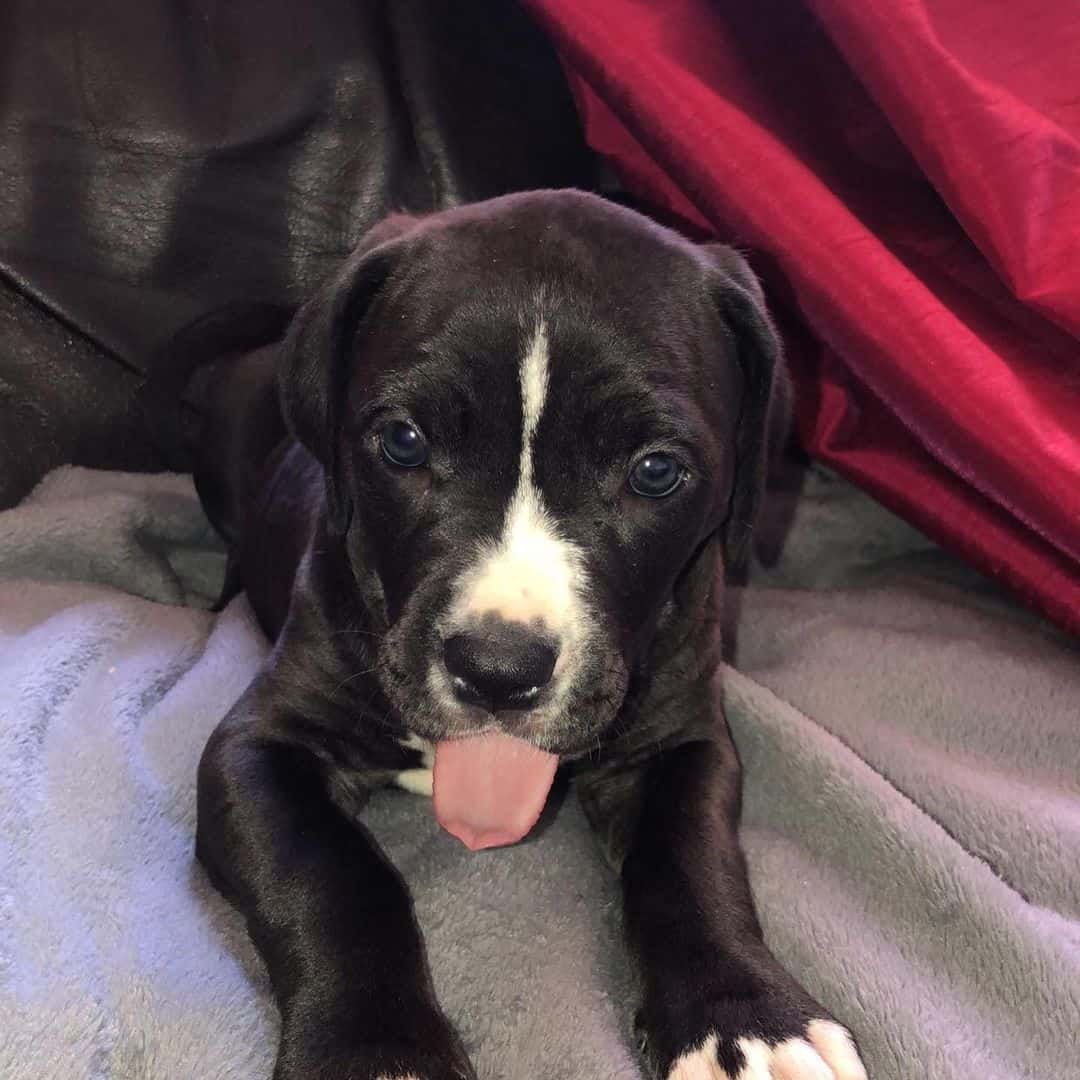
Photo from: @nalasworld._
A good breeder won’t part with their Bullmastiff Cane Corso puppies until they are between 8 and 12 weeks old. Before getting yours, you should prepare your home for its arrival.
Keep in mind that these aren’t like other pups. By the time they are 6 months old, they will probably weigh something like 60 lb. This means that puppy-proofing is even more important than ever as your pooch will be able to do things that smaller pups can’t do.
Even so, they still need proper care and attention. Check with your vet to make sure that you are feeding them the right amount, and that their vaccinations are up to date.
Keep anything you value out of their reach, especially when they are teething. Not only will they chew up shoes, books, ornaments, and the like, but some of these things present a choking hazard.
Make sure that electrical cables are tucked well away, and use child gates to confine the dog to areas where you don’t want it to go. You must assert your dominance in the early stages unless you want a 120 lb dog taking over when they’re older!
Cane Corso Bullmastiff Mix Temperament
It’s difficult to offer an accurate assessment because the breed is so new. Given the parent’s temperament, we can hazard a guess as to what the puppies might be like, but this will be a general assumption rather than a definite answer.
Both breeds are almost identical in terms of their attitude to strangers and other dogs. They are the best guard dog breeds and they’ll certainly be protective of you, your family, and your home.
They are alert and intelligent, but they do have a playful side. They can be affectionate, and despite their size, they are good with kids.They are alert and intelligent, but they do have a playful side. They can be affectionate, and despite their size, they are good with kids. Yes, even Cane Corsos might be good family dogs.
The biggest danger is if they knock them down, so you need to supervise any interaction with small children to avoid accidents.
As with all big and intimidating dogs, there are negative associations that lead people to believe that they won’t make good pets. This is unfair as the Cane Corso Bullmastiff mix will make a wonderful family dog when placed with the right family!
Cane Corso Bullmastiff Mix Weight
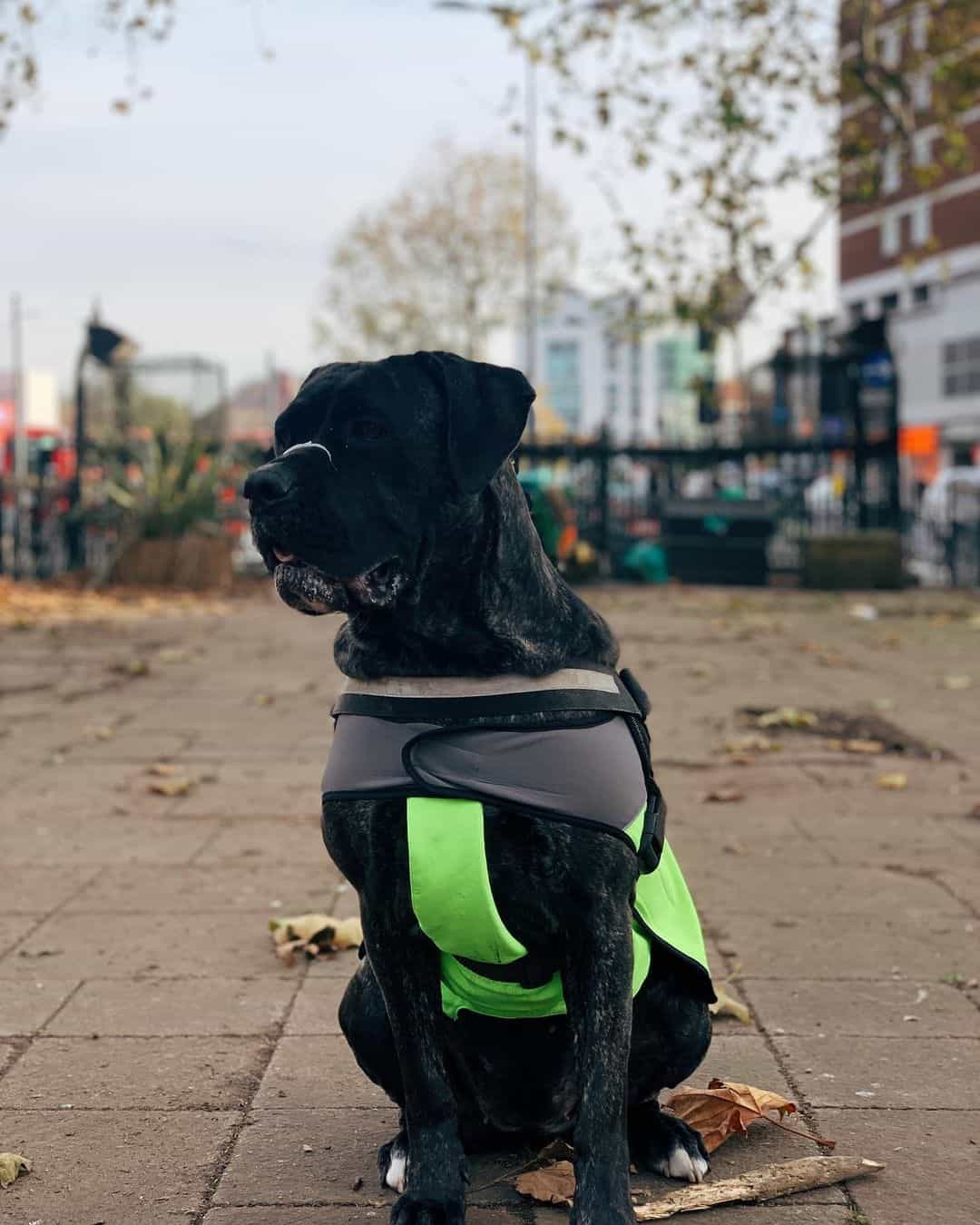
Photo from: @jessiethecanecorso
Guessing the weight of any dog while it’s still a pup is not an exact science. You can get a fair idea by looking at its parents, but there are other factors involved. For example, a puppy that doesn’t get enough nourishment in the first few months of its life may well be underweight for the rest of its life as it won’t develop properly.
Find Out More: Bullmastiff Growth Chart: They’re Large & They’re In Charge
As dog owners, we are often guilty of treating our best friend a little too well when it comes to food and treats, pushing their weight well beyond where it should be.
Using the parents as a guide, we can suggest that your Cane Corso Bullmastiff mix will weigh between 90 and 130 lb. It has to be said, though, that there are dogs of this breed out there that weigh as much as 160 lb, so be prepared!
The sex of your dog will have a bearing on this as females are generally lighter than males.
Full-grown Bullmastiff Cane Corso Mix
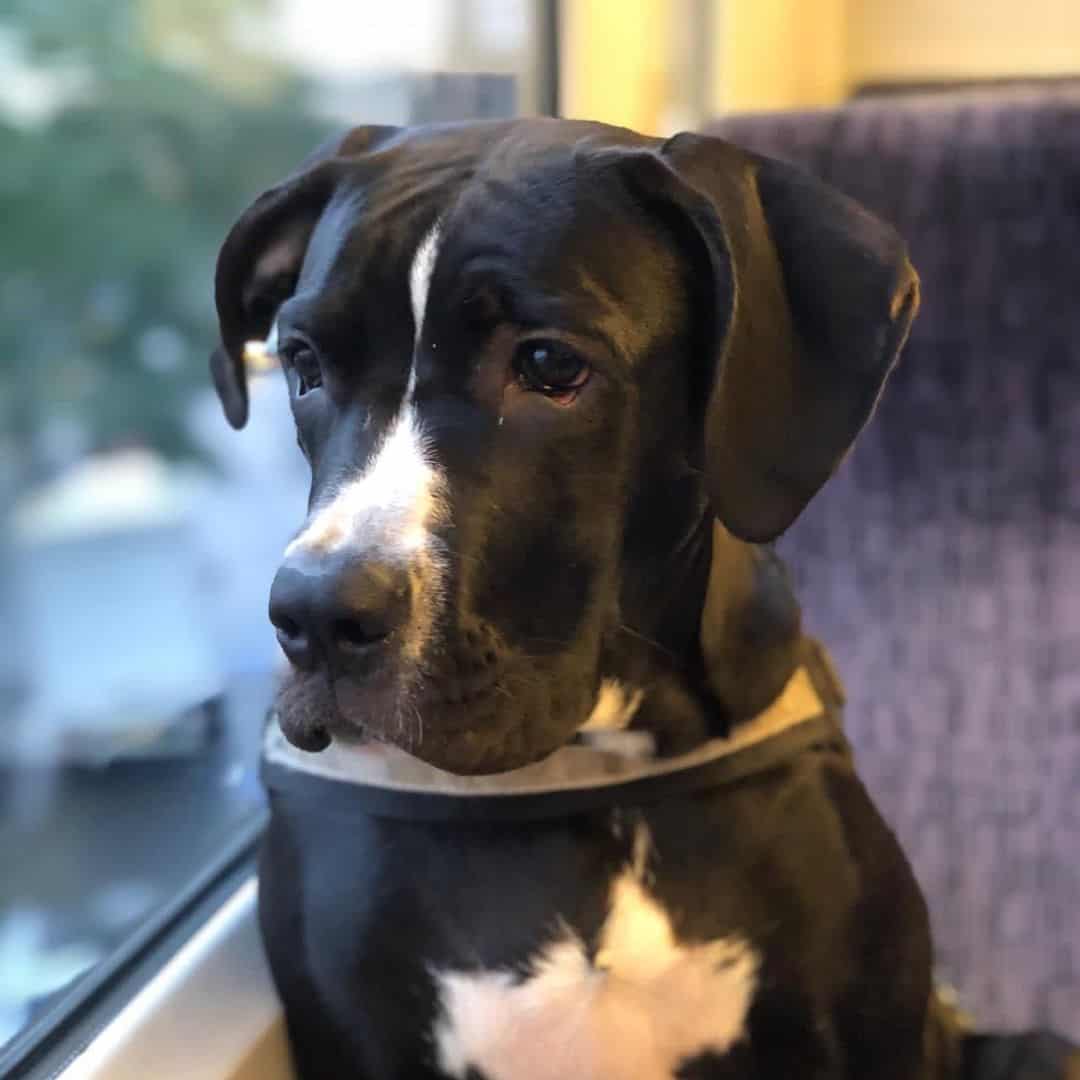
Photo from: @nalasworld._
This is covered in the section above, but it’s worth stressing that this is a giant dog. Whether it weighs 90 lb or 130 lb or even more, it will need a firm hand, plenty of space, and a lot of food! You need to prepare your bank account for this.
Feeding a Cane Corso dry food will cost around $1,000 a year, and that’s a conservative estimate.
Then, there’s the physical strength you’ll have to contend with. Training and socialization are vital to the success of this relationship. Both parent breeds have a reputation for sometimes being aggressive towards other dogs, so you need to eliminate this by getting them used to being around dogs of all types, starting as early as possible.
A well-trained and socialized dog is a joy to own as it will reduce the chances of any unpleasantness with strangers and other dogs.
Do They Have Any Health Issues?
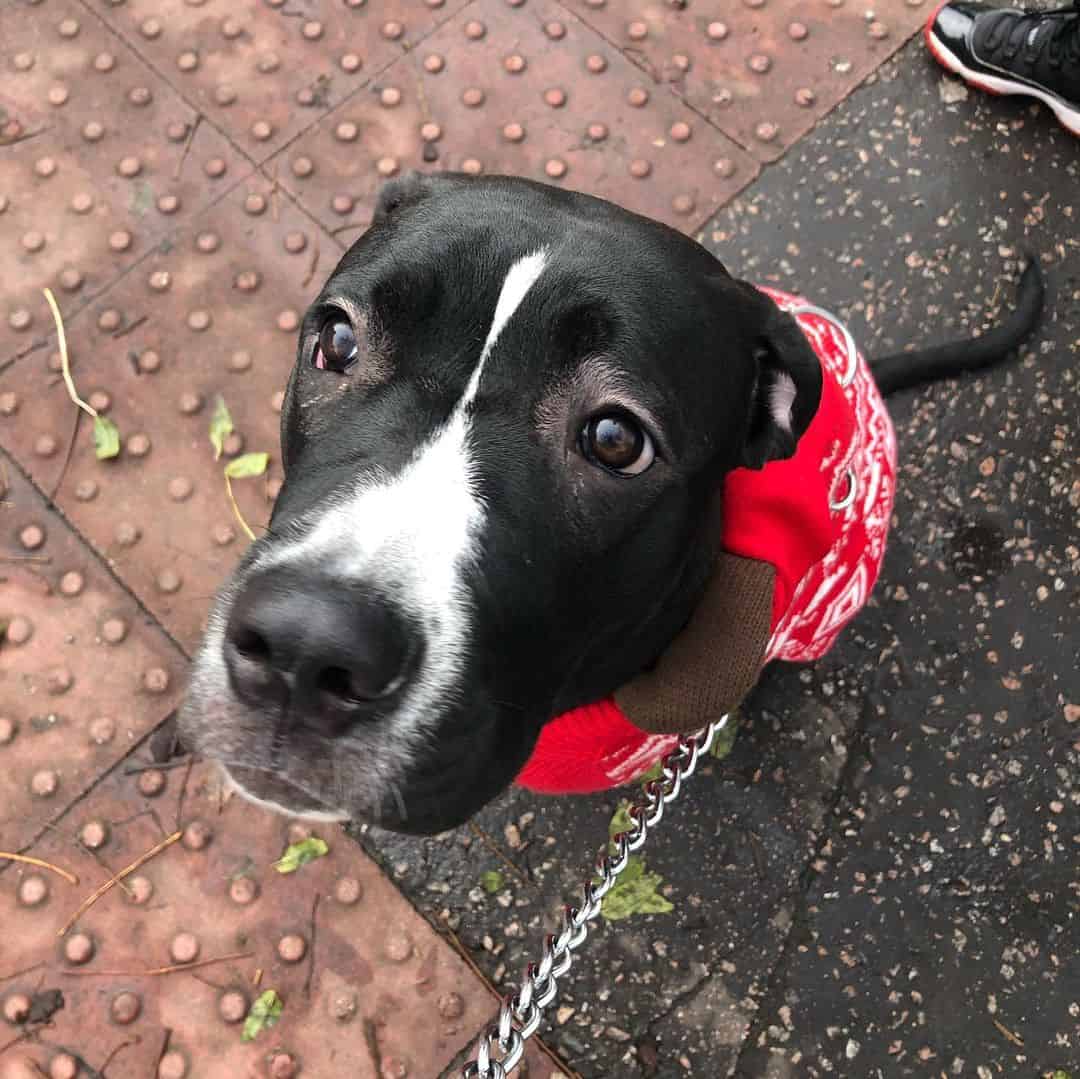
Photo from: @nalasworld._
Sadly, yes, just like any other dog, whether mixed breed or purebred.
However, there isn’t anything specific to the Cane Corso Bullmastiff mix; just the usual culprits that you’ll find listed against many other breeds. This doesn’t mean to say that they will definitely suffer from them all, and they may be lucky enough to avoid these altogether. It’s just a good idea to be aware of them so you know whether to take action. Early detection, diagnosis, and treatment are the keys to overcoming some of these conditions.
Let’s look at some of the common health conditions you should know about:
• Bloat – a potentially fatal condition where the stomach swells and twists on itself, cutting off the blood supply to the vital organs. One of the signs of bloat is excessive drooling, which might be hard to detect as these dogs are serious droolers. Other things to look out for are general restlessness, retching without being able to vomit, and excessive panting.
• Hip dysplasia – caused by a malformed hip joint, this condition is very painful and often requires surgery to fix it.
• Elbow dysplasia – a similar condition to the one above, but trickier to fix as the joint is more complex. Both conditions can lead to arthritis in old age if not treated.
• Hypothyroidism – an underactive thyroid that doesn’t produce the hormones needed for your dog to function properly. They will be lethargic, gain weight (although their appetite won’t increase), and you’ll notice that their coat will become dull and they’ll have skin problems.
• Cancer – lymphoma, and melanoma (cancer of the lymph nodes, and skin cancer) are the two main types seen in dogs. It can strike any time, though it tends to affect older dogs more. You should remain vigilant and check your dog for unusual lumps or odors. Early detection is the best way to improve their chances of survival.
• Eye problems – cherry eye is the most common of these, where the third eyelid becomes inflamed and protrudes outward. This is usually corrected by surgery. They can also suffer from entropion and ectropion, where the hairs on the eyelid turn inward or outward, scraping on the eyeball and causing irritation and ulcers.
• Ear infections – ears are warm and sometimes damp, making them ideal for bacteria to thrive in.
• Allergies – many dogs have food allergies or are allergic to environmental allergens, such as pollen or mold spores. The reaction is usually seen in their skin, which becomes red, itchy, and flaky.
• Demodex mange – all dogs without exception have colonies of mites living on their skin. These generally live in harmony with the dog and don’t cause any harm. However, occasionally, these colonies become too big and start to affect the dog’s skin, which becomes dry and scaly. Hair in the affected places will become patchy.
All of these conditions can be either avoided or treated if you are very careful. Only feed your dog the best food. Don’t give them scraps or human food (fried food is the worst!), and keep unhealthy treats to a minimum. Make sure your dog has fresh water every day, give them plenty of exercise, and get them checked out by a vet every few months.
The parent breeds have a lifespan of between 8 and 12 years, which is about right for most large dogs. Bear in mind that these are average figures, and that your Cane Corso Bullmastiff mix will have a good chance of beating this if you give it the opportunity!
Do Cane Corso Bullmastiff Mixes Need Much Grooming?
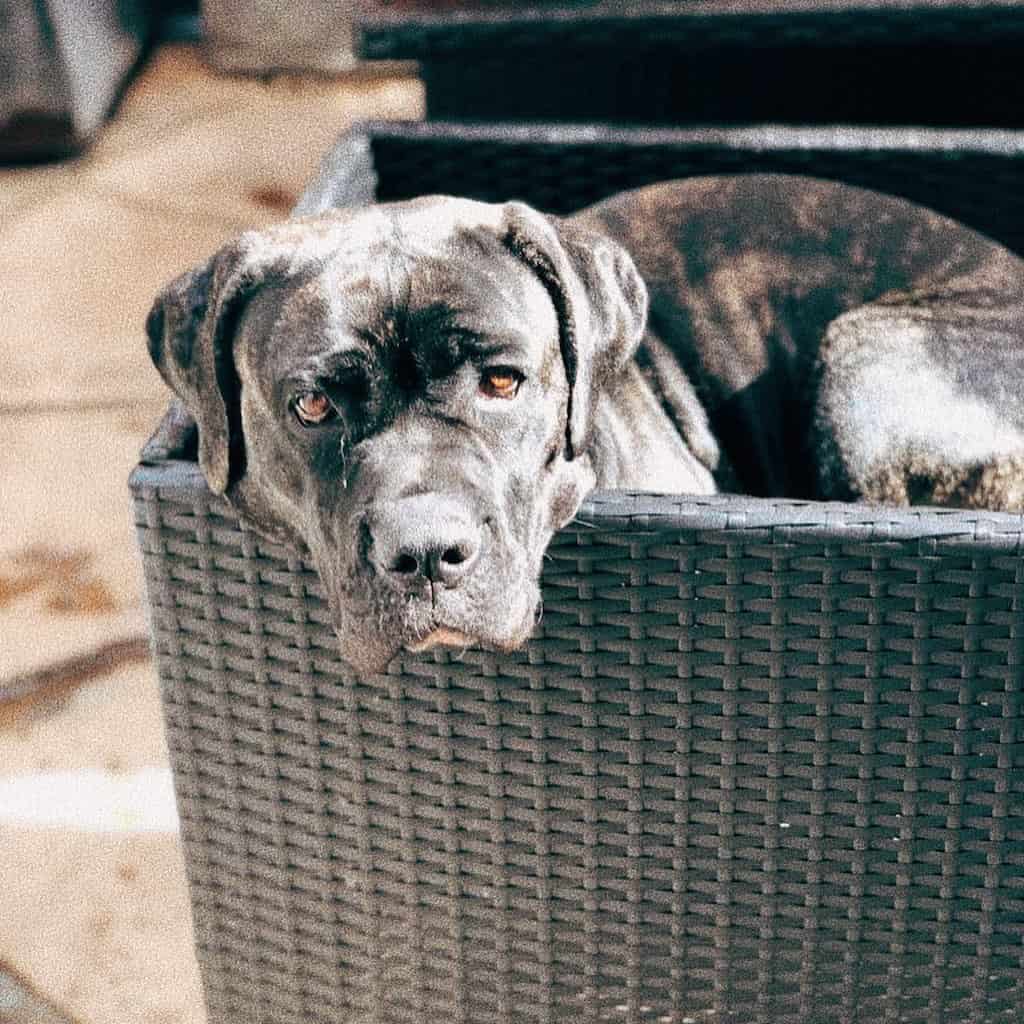
Photo from: @jessiethecanecorso
Yes, they probably do.
The trouble is that the Cane Corso Bullmastiff mix is pretty new to the hybrid scene, like so many others that have appeared in recent times. This makes it much more difficult to gather data about them as there just isn’t enough to build a comprehensive picture of the breed.
To get around this, the best thing to do is examine the parent breeds so we can get an idea of what to expect in their offspring.
The American Kennel Club (AKC) mentions on its website that both the parent breeds shed throughout the year or that they might suffer from ‘unusual hair loss.’
To manage this problem, you will need to brush them weekly (daily during the shedding season in spring and fall) and bathe them fairly regularly. For a dog of this size, that’s easier said than done!
Once you’ve done this, the grooming session doesn’t stop there…
Their toenails will need clipping to stop them from getting too long as this can be painful to them when they walk.
You’ll need to check inside their ears to make sure they are clean and free from dirt and earwax. Ears make great homes for bacteria, which is just waiting to start an infection. While most infections are mild and treatable, if they go undetected and untreated, they can easily move into the inner ear and cause permanent hearing damage.
And, then there are those huge teeth, which will need cleaning regularly. Oral hygiene is often overlooked by many dog owners who just don’t realize how serious the problems can be.
Aside from costing something like $3,000 to have a bad tooth extracted, dental infections affect dogs in far worse ways than they do humans. Many of the complications can be fatal.
When you own a dog, it is your responsibility to take care of them. And, that means doing all those jobs that you sometimes really don’t feel like doing.
Is The Cane Corso Bullmastiff Mix The Right Dog For You?
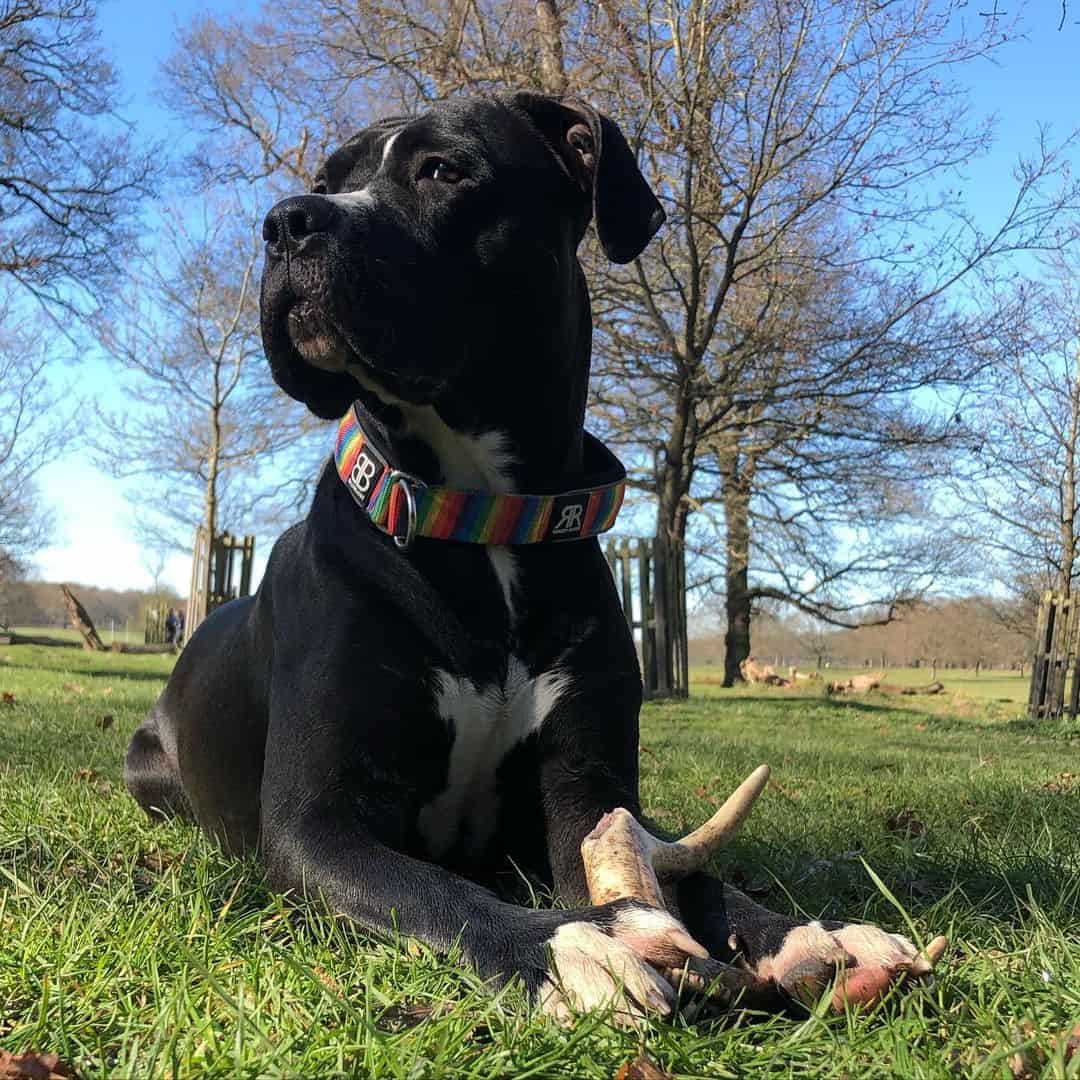
Photo from: @nalasworld._
We have to say right from the start that these are not the best dogs for first-time dog owners merely because of their immense size and strength. You need to have experience with dogs and an assertive personality to take them on.
The Cane Corso Bullmastiff mix is affectionate and loyal toward its family, but will be aloof to most strangers. Don’t expect them to welcome every stranger into your home. Socialization and training will help you here, but it’s in their nature to be wary of outsiders.
They will probably have a tendency to drool. If you have an aversion to puddles of drool around your home, you might want to avoid this breed. It will be worse around their eating area, but it can happen anywhere, anytime.
Does the sound of snoring make you want to scream? Then, perhaps the Cane Corso Bullmastiff mix isn’t for you! There’s a good chance that he will sound like a buzzsaw while he sleeps. This isn’t a dog you’d want sleeping in your bedroom even if it’s big enough.
And, how do you feel about dog hair? This dog might have a short coat, but that hair will get everywhere. And, we mean everywhere.
As well as having space in your home for one of these gentle giants, you must put aside at least two hours every day to exercise them. They need mental stimulation, too, and they will love training sessions.
If you can commit to all this and you aren’t put off by some of the less attractive traits, then perhaps the Cane Corso Bullmastiff mix is the dog for you after all. At the start, we said that it takes a special person to take them on. Perhaps that means you?
